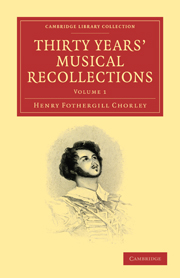THE YEAR 1841
Published online by Cambridge University Press: 29 August 2010
Summary
Neither of Donizetti's new operas had any success. Not a bar of “Fausta” lives; and only a song and a duett from “Roberto Devereux” are remembered. Queen Elizabeth has never been fortunate as an opera heroine : neither (by-the-way) has been Mary Stuart.
It was a matter of no common interest to be allowed to hear Cimarosa's “Gli Orazi,” though the tragedy was only executed “after a fashion.” But the hearing of the opera—when due allowance was afforded for all drawbacks—revealed the vast change which had passed over musical Drama, since that operatic setting of Corneille's play had been written. The music—the final duett excepted—seemed, on its revival, pleasing, but feeble beyond the power of acting to animate; telling of a time when the pleasure of the ear was cared for on the Opera-stage, without any close reference to dramatic truth or dignity. The old heroes and heroines stepped the boards rather than presented characters. Lord Mount-Edgecumbe recollects how the Gabrielli, (in her day more talked of than Mademoiselle Lind), “tucked up her hoop,” as Dido, ere she sidled into the flames of Carthage.—Even Malibran's sister, full of young dramatic fervour, could do nothing for the heroine, as draped by Cimarosa, analogous to that which Rachel did, when she electrified all Paris in the revival of the formal “Les Horaces” of Corneille. “Gli Orazi” is a weak opera—let it be taken how it will.
- Type
- Chapter
- Information
- Thirty Years' Musical Recollections , pp. 187 - 210Publisher: Cambridge University PressPrint publication year: 2009First published in: 1862

